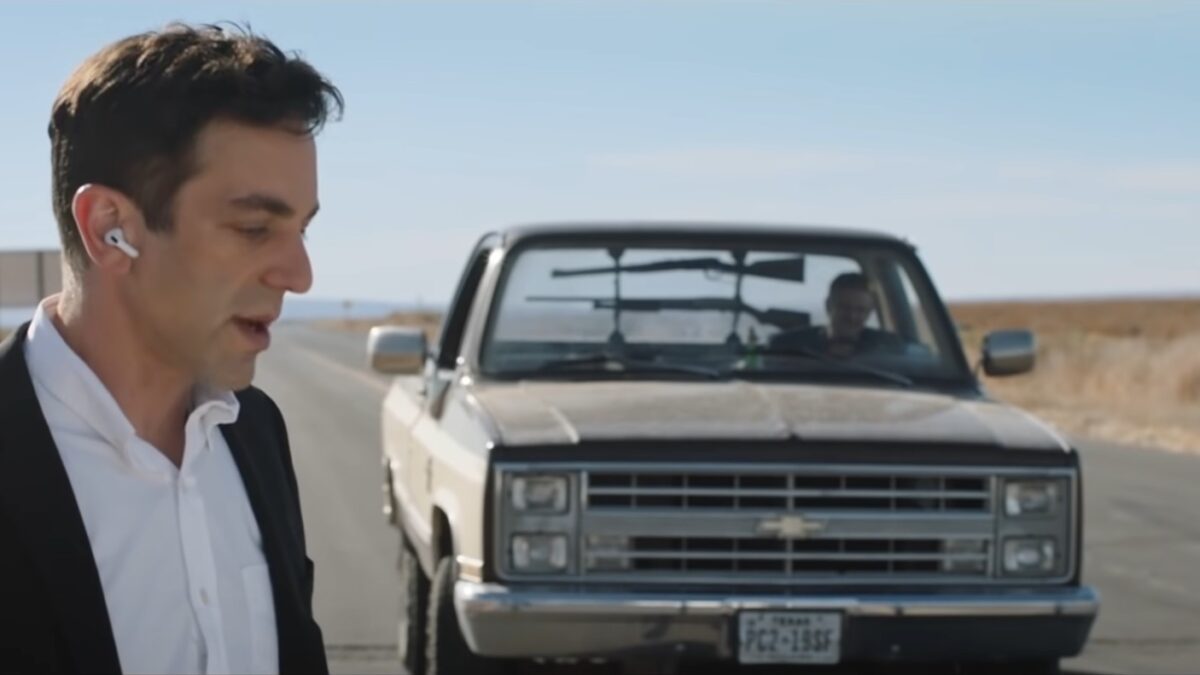For the longest time, comedy has been one-sided in its attempts at political satire; it always punches to the right in the pursuit of ridiculing red states and conservative beliefs.
There hasn’t been an act, television series, or movie that has simultaneously lampooned both the left and right until now. “Vengeance,” written and directed by B.J. Novak, is a film that successfully takes on the clash between a blue-state urbanite and a red-state town of West Texans.
Novak himself plays the protagonist Ben Manalowitz, a writer for the New Yorker who hopes to hit it big in the podcast world. When he receives the news of the death of one of his old hookups, Abilene Shaw, he reluctantly goes to her funeral over in West Texas. Abilene’s older brother Ty insists that his sister was murdered and pushes Ben to join him to avenge her death. This inspires Ben to make a podcast called “Dead White Girl,” where he documents the whole adventure and pretends to tell the story of modern-day America.
It’s evident that Novak has done his homework, which helps most of the film’s jokes to land. In a hilarious conversation with Ty, Ben learns that West Texas is a world apart from his beloved Austin as well as Dallas and Houston — cities Ty dismisses as not really Texas. Rather, West Texas is a dusty barren landscape peppered with oil rigs and tiny towns. The people there are huge Red Raider fans, love Whataburger, and are well versed in country music line dancing. Most cultural events, like the rodeo, are sponsored by various oil companies. Ben’s Prius and affinity for the UT Longhorns are downright offensive to these people.
That said, there are a few moments where Novak’s gags don’t quite hit the mark, and he resorts to idiotic stereotypes of West Texans. Specifically, at one point, the movie shows a 9-year-old playing with a handgun, the only Hispanics in the town are drug dealers associated with a cartel, and the Texan expressions like “y’all,” “fixin’ to,” and “bless your heart” tend to get overused. Aside from this, though, Novak shows great respect for his source material.
As with any good comedy, “Vengeance” really shines with its characters. Despite his limitations as an actor, Novak at least knows how to play himself. He accurately captures the thoughts, emotions, and expressions of a young writer from the city because he is a young writer from the city. Boyd Holbrook’s Ty Shaw, a dimwitted cowboy hoping to prove himself and is both funny and likable. Yet the performance that really steals the show is Ashton Kutcher’s Quentin Sellers, a soft-spoken record producer/philosopher who continually delivers pithy insights into the human condition.
The plot is well-paced and works for the most part. Novak knows better than to cram a bunch of gags together to maximize laughs. The scenes come off much more natural and varied, allowing for a more realistic development of the story.
Nevertheless, it must be said that the end of the movie is somewhat jarring. It breaks with the tone and style of the story along with the characters’ personalities up to that point. These final scenes are obviously meant to be deep and poignant but mainly come out of nowhere and undermine the movie’s humor and realism.
For all that, Novak makes an important argument about today’s cultural divide. While he can’t resist taking a few potshots at paranoid hicks in the sticks, he’s at least honest about just how vapid life has become for millennials and Gen Z in progressive cities. For all their supposed intellectual and moral superiority, their pursuits of hookups and internet fame often lack the meaning and wholesomeness of the simple pleasures of people in rural America.
At its heart, Novak and his generation’s crisis is a spiritual one, though his existentialist mindset only allows him to meet the problem halfway. Ben’s secular atheism enables him to shamelessly exploit his hosts for a good story, and it’s what keeps him alienated and lonely. It’s not just his aversion to commitment, his incredible vanity, and his iPhone addiction that lead to his demise, but his godlessness.
By contrast, the conservatism of West Texas and most places like it is not really the product of the harsh environment — as Kutcher’s character suggests — but of Christian values. Even if the film never touches it, Christianity is the prevailing force informing these people’s consciences and outlooks. Instead, Novak seems to adopt the amoral nihilism of “No Country for Old Men” for his take on Texas rather than the moral Bible-Belt Protestantism of “King of the Hill” or “Bernie,” which would’ve been a better fit for his cast of characters.
Of course, the very fact that “Vengeance” brings up such a discussion shows that Novak goes much further than simply ridiculing red states, which has become a staple of leftist comics. He is clearly seeking to do justice to both sides, daring to go as deep as it takes and even undergoing some self-reflection. He may not find solutions or get all his facts right, but he’s humble enough to identify the problems that seem to prevent people from knowing themselves and loving one another.
And for that, “Vengeance” is an excellent movie. Novak is a brilliant and perceptive filmmaker who knows how to hold the audience’s interest and make them laugh while giving them food for thought. He might not always understand the finer points of West Texas, but he does understand his own world and sees its profound limits.
“Vengeance” shows that if a person is looking for real community, meaningful relationships, and true purpose, he or she must ultimately leave their comfort zone and challenge themselves to grow.









